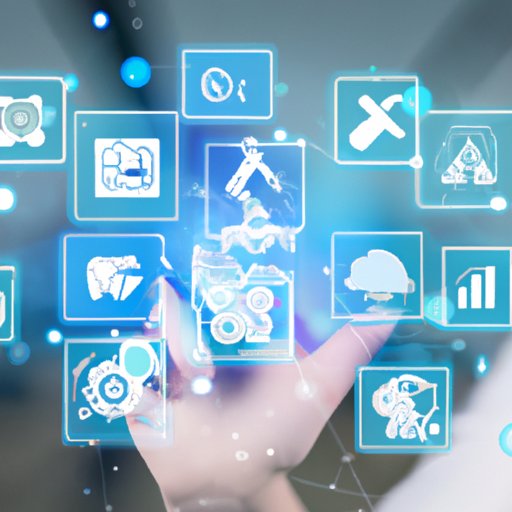Introduction
Artificial intelligence (AI) is a form of computer science that enables computers to mimic human behavior and decision-making. It has been around since the 1950s, but in recent years it has taken off with advances in technology and computing power. AI is now being used in many industries and sectors, including the economy. This article will explore how AI is helping the economy by automating manufacturing processes, increasing efficiency in business operations, enhancing customer service and experience, creating new job opportunities, generating cost savings, and improving predictive analysis for economic forecasting.
Automation of Manufacturing Processes
One of the ways that AI is helping the economy is through automation of manufacturing processes. Automation can reduce costs, increase productivity, and improve quality control. Automation also reduces the need for manual labor, which can save companies money on wages and benefits. There are several examples of automation in manufacturing, such as robotic assembly lines, automated machine vision systems, and computer-aided design and manufacturing (CAD/CAM). Automation has become more advanced and efficient over the years, and it is expected to continue to grow as AI technology develops.

Increasing Efficiency in Business Operations
Another way that AI is helping the economy is through increased efficiency in business operations. AI can automate tedious tasks, such as data entry, allowing employees to focus on more important tasks. AI can also provide insights and predictions that can help businesses make better decisions and optimize their operations. Examples of AI-driven efficiency include natural language processing for customer service chatbots, automated marketing campaigns, and automated supply chain management.
Enhancing Customer Service and Experience
AI can also be used to enhance customer service and experience. AI-powered chatbots can provide customers with instant responses to their inquiries and help them find the information they need quickly and easily. AI can also be used to personalize customer experiences by analyzing customer data and providing tailored recommendations. For example, AI-powered recommendation engines can suggest products and services that are most likely to be of interest to individual customers.
Creating New Job Opportunities
AI is not only helping the economy by increasing efficiency; it is also creating new job opportunities. As AI technology becomes more advanced and widespread, it is opening up new roles in fields such as data science, machine learning, and AI engineering. These jobs require specialized skills and knowledge, and they offer higher salaries than many other jobs. Additionally, AI is creating new entrepreneurial opportunities for those who want to start their own businesses using AI technology.
Generating Cost Savings
AI can also generate cost savings for businesses. AI can automate repetitive tasks, which can reduce labor costs. AI can also analyze large amounts of data quickly and accurately, allowing businesses to make better decisions faster. Additionally, AI can help businesses reduce errors and waste, leading to greater efficiency and lower costs.

Improving Predictive Analysis for Economic Forecasting
Finally, AI is helping the economy by improving predictive analysis for economic forecasting. AI-powered algorithms can analyze large amounts of data and detect patterns and trends that humans may not be able to see. This can help economists make more accurate predictions about future economic conditions, which can enable governments and businesses to plan accordingly.
Conclusion
In conclusion, AI is helping the economy in many ways, from automating manufacturing processes to increasing efficiency in business operations and generating cost savings. AI is also creating new job opportunities and enhancing customer service and experience. Finally, AI is improving predictive analysis for economic forecasting. The implications for the future of AI and the economy are far-reaching, and it is clear that AI will continue to play an important role in the global economy.
(Note: Is this article not meeting your expectations? Do you have knowledge or insights to share? Unlock new opportunities and expand your reach by joining our authors team. Click Registration to join us and share your expertise with our readers.)
